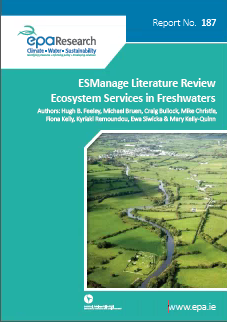Research 187 - ESManage Literature Review Ecosystem Services in Freshwaters
Authors: Hugh B. Feeley, Michael Bruen, Craig Bullock, Mike Christie, Fiona Kelly, Kyriaki Remoundou, Ewa Siwicka and Mary Kelly-Quinn
Summary: The ESManage Literature Review considers how the ecosystem services framework aligns with the objectives of current policy and legislation to inform management of freshwater resources.

Identifying Pressures
Ireland’s freshwaters are among the best in Europe. However, they are under increasing pressure from a range of land-use and other anthropogenic pressures, especially from elevated nutrients (nitrogen and phosphorus) and sediment inputs. The continuing loss of high status waters is a key concern. Planned future land-use intensification for food production, together with climate change will further stress aquatic resources both in terms of quality and quantity. The ESManage Literature Review highlights how pressures have implications for a range of ecosystem services derived from freshwaters.
Informing Policy
The ESManage Literature Review considers how the ecosystem services framework aligns with the objectives of current policy and legislation to inform management of freshwater resources. The Water Framework Directive (WFD) is the key EU driver requiring Member States to improve and sustainably manage water quality. The specific benefits of incorporating the ecosystem services framework into the implementation of the WFD relate to illustrating how human wellbeing is dependent on good ecological health and widening the focus from good ecological status as an end in itself to showing how it supports societal goals.
Developing Solutions
Identification of the chain of knowledge and data needs, as outlined in the ESManage Literature Review, is a key step in efforts to incorporate the ecosystem services framework into policy related to the management of freshwater resources. This review details these information needs and associated knowledge gaps, especially with respect to understanding the complex ecological linkages between the health and resilience of the ecosystem (critically dependent on biodiversity) and the provision of ecosystem services, converting this understanding into projections of possible future changes in ecosystem services provision that can be understood by the wider public, and identifying the means by which this public can value such changes to ecosystem service provision.
https://www.epa.ie/media/epa-2020/publications/research/thumb-187[1].png